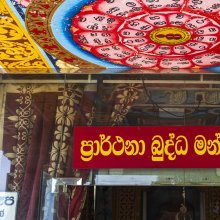Prarthana, Prārthanā: 26 definitions
Introduction:
Prarthana means something in Hinduism, Sanskrit, the history of ancient India, Marathi, Hindi. If you want to know the exact meaning, history, etymology or English translation of this term then check out the descriptions on this page. Add your comment or reference to a book if you want to contribute to this summary article.
Alternative spellings of this word include Prarthna.
Images (photo gallery)
In Hinduism
Natyashastra (theatrics and dramaturgy)
Source: Wisdom Library: Nāṭya-śāstraPrārthanā (प्रार्थना, “supplication”) refers to ‘solicitation’. Prārthanā represents one of the thirteen garbhasandhi, according to the Nāṭyaśāstra chapter 21. Garbhasandhi refers to the “segments (sandhi) of the development part (garbha)” and represents one of the five segments of the plot (itivṛtta or vastu) of a dramatic composition (nāṭaka).
Source: archive.org: Natya ShastraPrārthanā (प्रार्थना).—One of the thirteen elements of the ‘development segment’ (garbhasandhi);—(Description:) Request for love’s enjoyment (rati), rejoicing festivity and the like, is called Supplication (prārthanā).

Natyashastra (नाट्यशास्त्र, nāṭyaśāstra) refers to both the ancient Indian tradition (shastra) of performing arts, (natya—theatrics, drama, dance, music), as well as the name of a Sanskrit work dealing with these subjects. It also teaches the rules for composing Dramatic plays (nataka), construction and performance of Theater, and Poetic works (kavya).
Vyakarana (Sanskrit grammar)
Source: Shodhganga: Vaiyākaraṇabhūṣaṇasāra: a critical studyPrārthana (प्रार्थन).—Request; solicitation

Vyakarana (व्याकरण, vyākaraṇa) refers to Sanskrit grammar and represents one of the six additional sciences (vedanga) to be studied along with the Vedas. Vyakarana concerns itself with the rules of Sanskrit grammar and linguistic analysis in order to establish the correct context of words and sentences.
Ganapatya (worship of Ganesha)
Source: Google Books: Ganapati: Song of the SelfPrārthana (प्रार्थन) refers to “prayer”, representing one of the possible preliminary rites (upacāra) of a pūjā (deity worship).—Each act in a pūjā is not only physical and/or mental, but also symbolic, cosmic, and spiritual. Sprinkling, sipping, and bathing are symbolic of purification, of the worshipped as well as of the worshipper and the surroundings. Various offerings [viz., prārthana] symbolize the surrendering of one’s latent tendencies (vāsanā) as expressed in thoughts, words, and deeds.
Ganapatya (गाणपत्य, gāṇapatya) represents a tradition of Hinduism where Ganesha is revered and worshipped as the prime deity (ishta-devata). Being a minor though influential movement, Ganapatya evovled, llike Shaktism and Shaivism, as a separate movement leaving behind a large body of literature.
Shaivism (Shaiva philosophy)
Source: Shodhganga: Temple management in the ĀgamasPrārthanā (प्रार्थना, “prayer”) refers to a certain ceremony to be performed during pūjā (ritualistic worship), according to the Arcanāvidhipaṭala of Kāmikāgama.—Finally, the Ācārya offers culukodaka thrice, with a palmful of water and flowers. He prays to the Lord, “You are the protector of all mantra, secret and super-secret. Please accept and fructify this japa, granting us bhoga and mokṣa”. He then prays, ‘Please destroy the karma—both good and bad–that rest at your feet”. He then prays, “Śiva is the giver, Śiva is enjoyer, this world is nothing but Śiva. Śiva is the worshipper and everything else, so verily am I Śiva”. He then meditates on his Ātman and offers the fruit of his japa and pūjā up to Śiva, with bhakti. He then praises the Lord with several hymns and prostrates himself many times.

Shaiva (शैव, śaiva) or Shaivism (śaivism) represents a tradition of Hinduism worshiping Shiva as the supreme being. Closely related to Shaktism, Shaiva literature includes a range of scriptures, including Tantras, while the root of this tradition may be traced back to the ancient Vedas.
Ayurveda (science of life)
Source: gurumukhi.ru: Ayurveda glossary of termsPrārthanā (प्रार्थना):—Desire

Āyurveda (आयुर्वेद, ayurveda) is a branch of Indian science dealing with medicine, herbalism, taxology, anatomy, surgery, alchemy and related topics. Traditional practice of Āyurveda in ancient India dates back to at least the first millenium BC. Literature is commonly written in Sanskrit using various poetic metres.
Kavya (poetry)
Source: Brill: Śaivism and the Tantric Traditions (kavya)Prārthanā (प्रार्थना) refers to “prayers” (for obtaining a boon), according to Bāṇa’s Kādambarī (p. 226).—There are apparently several Tantric rites that Bāṇa pejoratively associates with the priest: he, “the ageing Draviḍa religious man” “demeans Durgā with his prayers (prārthanā) for the boon of sovereignty over the Southern lands”; “he had copied a hymn to Durgā on a strip of cloth”, “he had collected palm-leaf manuscripts of spells, Tantras and jugglery the letters of which were written in red lac and fumigated with smoke” [...].

Kavya (काव्य, kavya) refers to Sanskrit poetry, a popular ancient Indian tradition of literature. There have been many Sanskrit poets over the ages, hailing from ancient India and beyond. This topic includes mahakavya, or ‘epic poetry’ and natya, or ‘dramatic poetry’.
Purana and Itihasa (epic history)
Source: archive.org: Shiva Purana - English TranslationPrārthana (प्रार्थन) refers to a “request”, according to the Śivapurāṇa 2.3.42 (“Description of the meeting of the Lord and the Mountain”).—Accordingly, as Brahmā narrated to Nārada: “[...] The sons of the mountain accompanied by their relatives went to Śiva and acquainted him with the request (prārthana) of the mountain. The sons of the mountain came back to their abode with his permission and informed the king of mountains gladly that the bridegroom and the party were on their way there. O sage, on hearing the request thus made, Viṣṇu and other gods with the lord rejoiced much. [...]”.

The Purana (पुराण, purāṇas) refers to Sanskrit literature preserving ancient India’s vast cultural history, including historical legends, religious ceremonies, various arts and sciences. The eighteen mahapuranas total over 400,000 shlokas (metrical couplets) and date to at least several centuries BCE.
Dharmashastra (religious law)
Source: Oxford Academic: Homo Ritualis: Hindu Ritual and Its Significance to Ritual TheoryPrārthanā (प्रार्थना) refers to the “solicitation (of the groom)”, according to Dadhirāma Marāsini’s 19th century Vivāhapaddhati (part of his Karmakāṇḍabhāskara) which is based on the Pāraskara-Gṛhyasūtra, a domestic manual in the Mādhyandina school of the Vājasaneyisaṃhitā.—If performed traditionally, high caste marriages among the Parbatiyas (Parbates/Paharis/Pahadis) or Indo-Nepalese people in Nepal are normally executed by following the course of events as presented in marriage manuals. One of such rites, (classified as “Rules for choosing the groom”) is the worship and choosing of the arriving groom at the threshold or door, his solicitation (vara-prārthanā) and worship.

Dharmashastra (धर्मशास्त्र, dharmaśāstra) contains the instructions (shastra) regarding religious conduct of livelihood (dharma), ceremonies, jurisprudence (study of law) and more. It is categorized as smriti, an important and authoritative selection of books dealing with the Hindu lifestyle.
General definition (in Hinduism)
Source: ACHC: Smarta PujaPrārthana (प्रार्थन) refers to “prayer” representing one of the various preparatory rites performed before pūjā (ritualistic worship of a deity) which aim at the purification of the devotee.—[After devatāvandana or ‘salutation to the Gods’], the devotee recites a collection of verses addressed to different deities to obtain their protection (prārthana). There are three verses listing twelve names of Gaṇapati, a meditation (dhyāna) verse on Ganesa (4), a verse in praise of the mother goddess (5), three verses praising Viṣṇu (6-8), a verse addressing various deities (9), another one to Gaṇapati (10) and one to the triad (god) Brahman, Śiva and Viṣṇu (11).
Prārthana (prayer) is also offered nearing the end of a pūjā.—[After ṣoḍaśopacāra-pūjā], the devotee asks the deity to forgive deficiencies in the worship which might have occurred and asks for blessings. The fear of evil consequences of offences committed in the ritual is very old. Many rites are therefore followed by atonements (prayaścitta) to make up for such offences committed knowingly or unknowingly.
India history and geography
Source: Shodhganga: Vernacular architecture of Assam with special reference to Brahmaputra ValleyPrarthana is an Assamese term referring to “A prayer song”.—It appears in the study dealing with the vernacular architecture (local building construction) of Assam whose rich tradition is backed by the numerous communities and traditional cultures.

The history of India traces the identification of countries, villages, towns and other regions of India, as well as mythology, zoology, royal dynasties, rulers, tribes, local festivities and traditions and regional languages. Ancient India enjoyed religious freedom and encourages the path of Dharma, a concept common to Buddhism, Hinduism, and Jainism.
Languages of India and abroad
Marathi-English dictionary
Source: DDSA: The Molesworth Marathi and English Dictionaryprārthana (प्रार्थन).—n S prārthanā f (S) Begging, beseeching, petitioning, supplicating, entreating: also praying or prayer. v kara, māṇḍa. Ex. prārthanā bahuta āgama- nācī māṇḍalī ||.
Source: DDSA: The Aryabhusan school dictionary, Marathi-Englishprārthana (प्रार्थन).—n prārthanā f Begging, beseeching.
Marathi is an Indo-European language having over 70 million native speakers people in (predominantly) Maharashtra India. Marathi, like many other Indo-Aryan languages, evolved from early forms of Prakrit, which itself is a subset of Sanskrit, one of the most ancient languages of the world.
Sanskrit dictionary
Source: DDSA: The practical Sanskrit-English dictionaryPrārthana (प्रार्थन) or Prārthanā (प्रार्थना).—
1) A request, entreaty, prayer, solicitation; ये वर्धन्ते धनपतिपुरःप्रार्थनादुःखभाजः (ye vardhante dhanapatipuraḥprārthanāduḥkhabhājaḥ) Bhartṛhari 3.47.
2) A wish, desire; लब्धावकाशा मे प्रार्थना (labdhāvakāśā me prārthanā) or न दुरवापेयं खलु प्रार्थना (na duravāpeyaṃ khalu prārthanā) Ś.1;2.1; उत्सर्पिणी खलु महतां प्रार्थना (utsarpiṇī khalu mahatāṃ prārthanā) Ś.7;7.2.
3) A suit, petition, supplication, a love-suit; कदाचिदस्मत्प्रार्थनामन्तः- पुरेभ्यः कथयेत् (kadācidasmatprārthanāmantaḥ- purebhyaḥ kathayet) Ś.2. (the object is expressed by the loc.; as in śakuntalāyāṃ prārthanā).
4) Name of a Mudrā; प्रसृताङ्गु- लिकौ हस्तौ मिथः श्लिष्टौ च संमुखे । कुर्यात् स्वहृदये सेयं मुद्रा स्यात् प्रार्थनाभिधा (prasṛtāṅgu- likau hastau mithaḥ śliṣṭau ca saṃmukhe | kuryāt svahṛdaye seyaṃ mudrā syāt prārthanābhidhā) Tantrasāra.
Derivable forms: prārthanam (प्रार्थनम्).
Source: Cologne Digital Sanskrit Dictionaries: Edgerton Buddhist Hybrid Sanskrit DictionaryPrārthanā (प्रार्थना).—seems = praṇidhāna, praṇidhi, in Saddharmapuṇḍarīka 70.10 (verse) ārāgitaś ca yad (WT with most mss. saṃ-) [Page393-b+ 71] buddhaḥ °nā bhotu bodhaye,…may there ensue (for us) an earnest wish for enlightenment.
Source: Cologne Digital Sanskrit Dictionaries: Shabda-Sagara Sanskrit-English DictionaryPrārthana (प्रार्थन).—nf.
(-naṃ-nā) Asking, begging. E. ba before, artha to ask, aff. yuc.
--- OR ---
Prārthanā (प्रार्थना).—f.
(-nā) 1. Desire. 2. Solicitation. 3. Prayer, request.
Source: Cologne Digital Sanskrit Dictionaries: Benfey Sanskrit-English DictionaryPrārthana (प्रार्थन).—i. e. pra-arth + ana, n., and f. nā. 1. Asking, [Pañcatantra] 169, 7; demand, [Pañcatantra] 5, 5. 2. Desire, wish, [Vikramorvaśī, (ed. Bollensen.)] 50, 5; wishing for, [Śākuntala, (ed. Böhtlingk.)] 15, 11.
Source: Cologne Digital Sanskrit Dictionaries: Cappeller Sanskrit-English DictionaryPrārthana (प्रार्थन).—[neuter] nā [feminine] desire, wish; requesting, begging; petition or suit for ([locative] or —°).
Source: Cologne Digital Sanskrit Dictionaries: Monier-Williams Sanskrit-English Dictionary1) Prārthana (प्रार्थन):—[from prārtha > prārth] n. wish, desire, request, entreaty, solicitation, petition or suit for ([locative case] or [compound]), [Mahābhārata; Kāvya literature] etc.
2) Prārthanā (प्रार्थना):—[from prārtha > prārth] f. = na, [Mahābhārata; Kāvya literature] etc. (nayā ind. at the request or petition of any one)
3) [v.s. ...] prayer (as forming part of the worship of the gods), [Religious Thought and Life in India 16]
Source: Cologne Digital Sanskrit Dictionaries: Yates Sanskrit-English DictionaryPrārthanā (प्रार्थना):—(nā) 1. f. Asking, prayer.
Source: DDSA: Paia-sadda-mahannavo; a comprehensive Prakrit Hindi dictionary (S)Prārthana (प्रार्थन) in the Sanskrit language is related to the Prakrit words: Patthaṇa, Patthaṇayā, Patthaṇā.
[Sanskrit to German]
Sanskrit, also spelled संस्कृतम् (saṃskṛtam), is an ancient language of India commonly seen as the grandmother of the Indo-European language family (even English!). Closely allied with Prakrit and Pali, Sanskrit is more exhaustive in both grammar and terms and has the most extensive collection of literature in the world, greatly surpassing its sister-languages Greek and Latin.
Hindi dictionary
Source: DDSA: A practical Hindi-English dictionaryPrārthanā (प्रार्थना) [Also spelled prarthna]:—(nf) a prayer; request, solicitation; petition; ~[tmaka] precatory, containing a prayer/request; -[patra] an application; a petition; —[samāja] a socio-religious reformist movement launched in late sixties of the 19th century and influenced by the mediaeval Maharashtrian saints.
...
Kannada-English dictionary
Source: Alar: Kannada-English corpusPrārthana (ಪ್ರಾರ್ಥನ):—[noun] = ಪ್ರಾರ್ಥನೆ [prarthane].
Kannada is a Dravidian language (as opposed to the Indo-European language family) mainly spoken in the southwestern region of India.
Nepali dictionary
Source: unoes: Nepali-English DictionaryPrārthanā (प्रार्थना):—n. 1. prayer; request; petition; 2. wish; desire;
Nepali is the primary language of the Nepalese people counting almost 20 million native speakers. The country of Nepal is situated in the Himalaya mountain range to the north of India.
See also (Relevant definitions)
Starts with: Prarthanabhanga, Prarthanabhava, Prarthanaduhkhabhaj, Prarthanamgey, Prarthanapaddhati, Prarthanapancaka, Prarthanapatra, Prarthanashataka, Prarthanasiddhi, Prarthanaya.
Ends with: Acaryaprarthana, Alambitaprarthana, Anujnanaprarthana, Anujnaprarthana, Aprarthana, Bhagirathiprarthana, Bhaktiprarthana, Rupamanjaripadambujasevaprarthana, Samagamaprarthana, Samprarthana, Saphalaprarthana, Sevanantaram prarthana, Svaminiprarthana, Varaprarthana, Yatishvaraprarthana.
Full-text (+34): Anujnaprarthana, Prarthanabhanga, Prarthanasiddhi, Saphalaprarthana, Patthana, Patthaya, Utsarpin, Prarthanabhava, Prarthanaduhkhabhaj, Prarthanapancaka, Prarthanashataka, Kritarthay, Bhagirathiprarthana, Bhaktiprarthana, Varaprarthana, Shivaprarthanastotra, Prarthanem, Yatishvaraprarthana, Prarthanaya, Sevanantaram prarthana.
Relevant text
Search found 28 books and stories containing Prarthana, Prārthanā, Prārthana; (plurals include: Prarthanas, Prārthanās, Prārthanas). You can also click to the full overview containing English textual excerpts. Below are direct links for the most relevant articles:
Garga Samhita (English) (by Danavir Goswami)
Verse 3.9.29 < [Chapter 9 - The Birth of Śrī Girirāja]
Verse 4.20.21 < [Chapter 20 - The Killing of Pralamba]
Mimamsa interpretation of Vedic Injunctions (Vidhi) (by Shreebas Debnath)
Sahitya-kaumudi by Baladeva Vidyabhushana (by Gaurapada Dāsa)
Chaitanya Bhagavata (by Bhumipati Dāsa)
Verse 2.23.469-470 < [Chapter 23 - Wandering about Navadvīpa On the Day the Lord Delivered the Kazi]
Verse 2.1.398-399 < [Chapter 1 - The Beginning of the Lord’s Manifestation and His Instructions on Kṛṣṇa-saṅkīrtana]
Verse 1.1.78 < [Chapter 1 - Summary of Lord Gaura’s Pastimes]
Vakyapadiya of Bhartrihari (by K. A. Subramania Iyer)
Verse 3.7.16-17 < [Book 3 - Pada-kāṇḍa (7): Sādhana-samuddeśa (On the Means)]
Varahi Tantra (English Study) (by Roberta Pamio)
Chapter 8 - Āpadūddharaṇa Kavaca (a hymn dedicated to Kālī) < [Summary of the Vārāhī Tantra]
Related products



